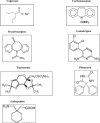Is anticonvulsant treatment of mania a class effect? Data from randomized clinical trials
- PMID: 20015083
- PMCID: PMC6493801
- DOI: 10.1111/j.1755-5949.2009.00089.x
Is anticonvulsant treatment of mania a class effect? Data from randomized clinical trials
Abstract
Our aim was to evaluate the efficacy and tolerability of anticonvulsant agents for the treatment of acute bipolar mania and ascertain if their effects on mania are a "class" effect. We conducted a systematic review of randomized controlled trials (RCTs) with placebo or active comparator, in acute bipolar mania in order to summarize available data on anticonvulsant treatment of mania/mixed episodes. We searched (PubMed/MEDLINE) with the combination of the words "acute mania" and "clinical trials" with each one of the following words: "anticonvulsants/antiepileptics,""valproic/valproate/divalproex,""carbamazepine,""oxcarbazepine,""lamotrigine,""gabapentin,""topiramate,""phenytoin,""zonisamide,""retigabine,""pregabalin,""tiagabine,""levetiracetam,""licarbazepine,""felbamate," and "vigabatrin." Original articles were found until November 1, 2008. Data from 35 randomized clinical trials suggested that not all anticonvulsants are efficacious for the treatment of acute mania. Valproate showed greater efficacy in reducing manic symptoms, with response rates around 50% compared to a placebo effect of 20-30%. It appears to have a more robust antimanic effect than lithium in rapid cycling and mixed episodes. As valproate, the antimanic effects of carbamazepine have been demonstrated. Evidences did not support the efficacy of the gabapentin, topiramate as well as lamotrigine as monotherapy in acute mania and mixed episodes. Oxcarbazepine data are inconclusive and data regarding other anticonvulsants are not available. Anticonvulsants are not a class when treating mania. While valproate and carbamazepine are significantly more effective than placebo, gabapentin, topiramate, and lamotrigine are not. However, some anticonvulsants may be efficacious in treating some psychiatric comorbidities that are commonly associated to bipolar illness.
© 2009 Blackwell Publishing Ltd.
Conflict of interest statement
Eduard Vieta received grant/research support from Almirall, Astra‐Zeneca, Bristol‐Myers Squibb, Eli Lilly, the European 7th Framework Program, GlaxoSmithKline, Janssen‐Cilag, Novartis, Organon, Otsuka, Pfizer, Sanofi‐Aventis, Seny Foundantion, Servier, the Spanish Ministry of Health (CIBERSAM), the Spanish Ministry of Science and Education, and the Sr¡tanley Medical Research Institute. Eduard Vieta has served as consultant for Astra‐Zeneca, Bristol‐Myers, Squibb, Eli Lilly, Forest Research Institute, GlaxoSmithKline, Janssen, Jazz, Lundbeck, Novartis, Organon, Otsuka, Pfizer, Sanofi‐Aventis, Servier, and UBC. He has been a member of the speakers boards from Almirall, Astra‐Zeneca, Bristol‐Myers, Eli Lilly, Esteve, GlaxoSmithKline, Janssen, Lundbeck, Novartis, Organon, Otsuka, Pfizer, Sanofi‐Aventis, and Servier.
Adriane Ribeiro Rosa has been a member of the speakers boards from Astra‐Zeneca.
Dr. Fountoulakis is member of the International Consultation Board of Wyeth for desvenlafaxine, national coordinator for the trial CL3‐20098‐062 and has received honoraria for lectures from AstraZeneca, Janssen‐Cilag, Eli‐Lilly, and research grants from AstraZeneca, Wyeth, Pfizer, Janssen, Lilly, and Pfizer Foundation.
Dr. Xenia Gonda has received travel grants from Richter, GlaxoSmithkline, Schering plough, Organon, Krka, and Lilly.
Similar articles
-
Antiepileptic drug monotherapy for epilepsy: a network meta-analysis of individual participant data.Cochrane Database Syst Rev. 2017 Dec 15;12(12):CD011412. doi: 10.1002/14651858.CD011412.pub3. Cochrane Database Syst Rev. 2017. Update in: Cochrane Database Syst Rev. 2022 Apr 1;4:CD011412. doi: 10.1002/14651858.CD011412.pub4. PMID: 29243813 Free PMC article. Updated.
-
Antiepileptic drug monotherapy for epilepsy: a network meta-analysis of individual participant data.Cochrane Database Syst Rev. 2017 Jun 29;6(6):CD011412. doi: 10.1002/14651858.CD011412.pub2. Cochrane Database Syst Rev. 2017. Update in: Cochrane Database Syst Rev. 2017 Dec 15;12:CD011412. doi: 10.1002/14651858.CD011412.pub3. PMID: 28661008 Free PMC article. Updated.
-
A systematic review and economic model of the clinical effectiveness and cost-effectiveness of interventions for preventing relapse in people with bipolar disorder.Health Technol Assess. 2007 Oct;11(39):iii-iv, ix-206. doi: 10.3310/hta11390. Health Technol Assess. 2007. PMID: 17903393
-
Oxcarbazepine for acute affective episodes in bipolar disorder.Cochrane Database Syst Rev. 2011 Dec 7;(12):CD004857. doi: 10.1002/14651858.CD004857.pub2. Cochrane Database Syst Rev. 2011. PMID: 22161387
-
A rapid and systematic review and economic evaluation of the clinical and cost-effectiveness of newer drugs for treatment of mania associated with bipolar affective disorder.Health Technol Assess. 2004 May;8(19):iii-iv, 1-187. doi: 10.3310/hta8190. Health Technol Assess. 2004. PMID: 15147609
Cited by
-
Challenges in the development of treatment guidelines for bipolar disorder.Front Psychiatry. 2025 Jun 10;16:1564004. doi: 10.3389/fpsyt.2025.1564004. eCollection 2025. Front Psychiatry. 2025. PMID: 40557137 Free PMC article.
-
Lithium for prevention of mood episodes in bipolar disorders: systematic review and meta-analysis.Int J Bipolar Disord. 2014 Dec 20;2:15. doi: 10.1186/s40345-014-0015-8. eCollection 2014. Int J Bipolar Disord. 2014. PMID: 25530932 Free PMC article.
-
Personalized Pharmacotherapy for Bipolar Disorder: How to Tailor Findings From Randomized Trials to Individual Patient-Level Outcomes.Focus (Am Psychiatr Publ). 2019 Jul;17(3):206-217. doi: 10.1176/appi.focus.20190005. Epub 2019 Jul 16. Focus (Am Psychiatr Publ). 2019. PMID: 32047366 Free PMC article. Review.
-
Treatment of bipolar disorders during pregnancy: maternal and fetal safety and challenges.Drug Healthc Patient Saf. 2014 Dec 24;7:7-29. doi: 10.2147/DHPS.S50556. eCollection 2015. Drug Healthc Patient Saf. 2014. PMID: 25565896 Free PMC article. Review.
-
The CINP Guidelines on the Definition and Evidence-Based Interventions for Treatment-Resistant Bipolar Disorder.Int J Neuropsychopharmacol. 2020 Apr 23;23(4):230-256. doi: 10.1093/ijnp/pyz064. Int J Neuropsychopharmacol. 2020. PMID: 31802122 Free PMC article.
References
-
- Hirschfeld RMA, Keck CPE, Gitlin MJ, Price LH, Sajatovic M, Suples M, Thase ME, Perlis RH. Practice Guideline for the treatment of patients with bipolar disorder. Third Edition, Am J Psychiatry, in press.
-
- Bowden CL, Karren NU. Anticonvulsants in bipolar disorder. Aust N Z J Psychiatry 2006;40:386–393. - PubMed
-
- Fountoulakis KN, Vieta E. Treatment of bipolar disorder: A systematic review of available data and clinical perspectives. Int J Neuropsychopharmacol 2008;11:999–1029. - PubMed
-
- Vieta E, Sugranyes G, Goikolea JM. New anticonvulsants in bipolar disorder: All that glisters is not gold. Adv Schizophr Clin Psychitray 2008;4:106–113.
Publication types
MeSH terms
Substances
LinkOut - more resources
Full Text Sources
Medical
Research Materials


